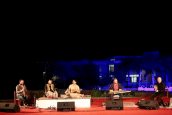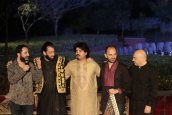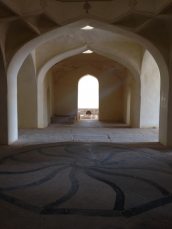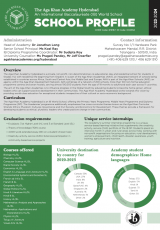Contemporary music from the Silk Route – Aga Khan Music Initiative performs at the Academy
 An ensemble of five soloists from the Aga Khan Music Initiative, a program of Geneva-based Aga Khan Trust for Culture (AKTC), performed a ‘Sunset Silk Route’ concert celebrating the rich musical traditions of Central Asia and the Great Silk Route at the Aga Khan Academy Hyderabad on Wednesday 25th January. The audience numbered close to 400 and included students, staff, parents and invited guests.
An ensemble of five soloists from the Aga Khan Music Initiative, a program of Geneva-based Aga Khan Trust for Culture (AKTC), performed a ‘Sunset Silk Route’ concert celebrating the rich musical traditions of Central Asia and the Great Silk Route at the Aga Khan Academy Hyderabad on Wednesday 25th January. The audience numbered close to 400 and included students, staff, parents and invited guests.
Held at the Academy Amphitheatre under starry skies, the 1.5-hour long concert was incredibly well-received by a mesmerized audience, as Afghan rubab virtuoso Homayoun Sakhi, Syrian composer-saxophonist Basel Rajoub, tabla master Salar Nader, qānun player Feras Charestan, and frame drummer Andreas Piccioni, performed a newly-created repertoire of compositions, improvisations and contemporary arrangements inspired by tradition. This unique combination of instruments which represent Eastern and Western ends of the historical Silk Route as well as ancient and contemporary musical cultures.
The evening performance followed morning and afternoon sessions with Academy Junior and Senior School students where the musicians played their instruments, explained their music and were taken through a Q&A session. AKMI’s Silk Route program fits in with the Academy’s internally designed, interdisciplinary IB module on the Silk Route for Grade 7 Music, and Individuals and Society subjects.
As students move through the unit they explore the key concept of change and the related concepts of exchange and narrative. Their summative assessment at the end of the unit is a play script with musical accompaniment. Students each create a character for themselves – perhaps a trader, a pilgrim, a musician or a caravanserai owner and perform their part, showing their understanding of the way this fascinating medieval trade route facilitated ideas and innovations.
“I really loved the way they coordinated with each other, like they put together the piece of music really well,” reflects Amaanya, grade 5. “It was very inspiring because I love to discover different types of instruments that musicians use and different ways of inventing new music. The songs which they composed were very nice to hear, I really loved it. I had never heard this type of music anywhere.”
 This special group of musicians are involved in the revival and restoration of dying ancient musical traditions from challenged parts of the world as part of AKTC’s overarching commitment to supporting culture and heritage initiatives across the developing world. The trans-Eurasian trade routes collectively known as the Silk Route served as conduits not only of commerce but of cultural exchange, which included music, musicians, and musical instruments. The Music Initiative works with talented musicians from 11 countries in Asia, Africa, and the Middle East to celebrate cultural diversity, promote dialogue among cultures and civilizations through languages of art, and help local musical communities further develop their musical heritage in contemporary forms.
This special group of musicians are involved in the revival and restoration of dying ancient musical traditions from challenged parts of the world as part of AKTC’s overarching commitment to supporting culture and heritage initiatives across the developing world. The trans-Eurasian trade routes collectively known as the Silk Route served as conduits not only of commerce but of cultural exchange, which included music, musicians, and musical instruments. The Music Initiative works with talented musicians from 11 countries in Asia, Africa, and the Middle East to celebrate cultural diversity, promote dialogue among cultures and civilizations through languages of art, and help local musical communities further develop their musical heritage in contemporary forms.
AKMI visitors also experienced a city heritage tour which involved a personalized tour by the chief architect at the Qutb Shahi tombs, another restoration and conservation project led by the AKTC.
 Fairouz R. Nishanova, Director of the Aga Khan Music Initiative, said, “AKMI is delighted at this partnership opportunity and is looking forward to sharing richness and diversity of the artistic traditions from countries and regions where we have the privilege to work with the students of the Academy. We hope that this first experience will translate into regular arts and music-making session with the student body.”
Fairouz R. Nishanova, Director of the Aga Khan Music Initiative, said, “AKMI is delighted at this partnership opportunity and is looking forward to sharing richness and diversity of the artistic traditions from countries and regions where we have the privilege to work with the students of the Academy. We hope that this first experience will translate into regular arts and music-making session with the student body.”





